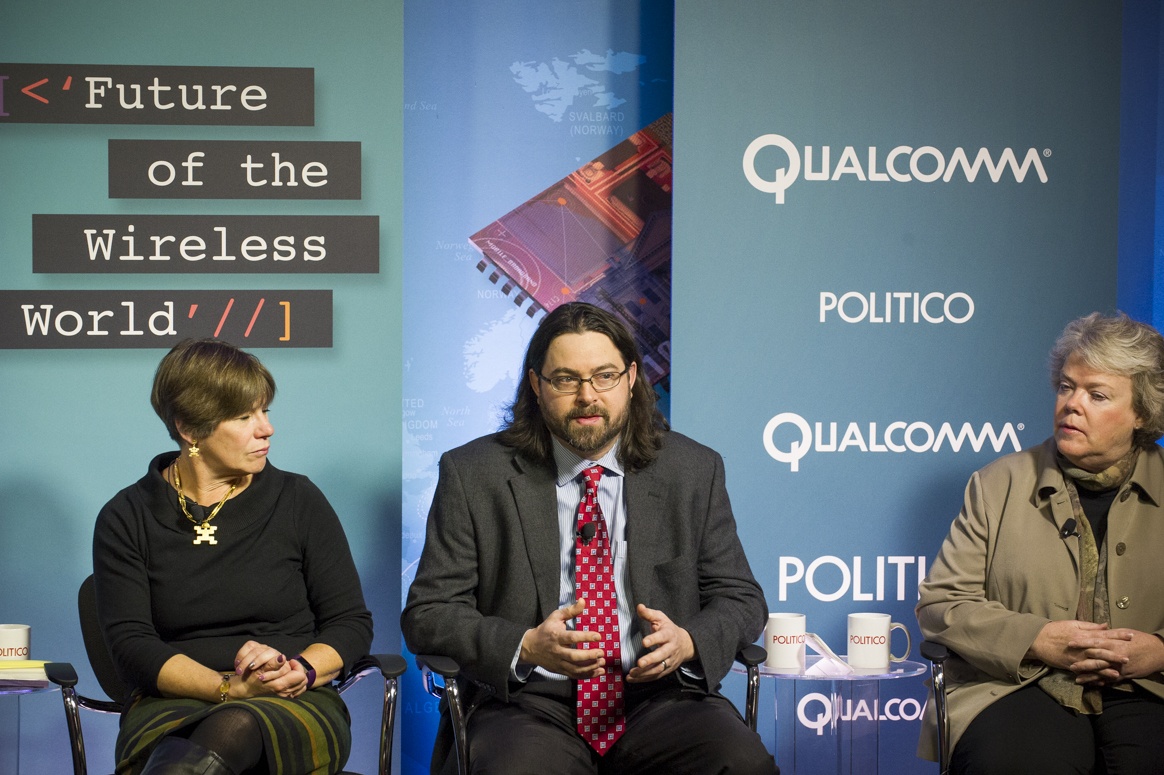
Fast, affordable Internet access for all.

A new report from the National Digital Inclusion Alliance and Connect Your Community concludes that the telecom giant AT&T has redlined low-income neighborhoods in Cleveland. The company has cherry-picked higher-income neighborhoods for new technology investments and skipped over neighborhoods with high-proverty rates.
AT&T’s Digital Redlining, uses publicly available data from the FCC and the American Community Survey to expose how AT&T has failed to invest in low-income communities in Cleveland.
See With Your Own Eyes
Read the report and explore the interactive maps on digitalinclusion.org. The National Digital Inclusion Alliance and Connect Your Community spent six months uncovering how AT&T has systematically passed over communities with high poverty rates. The five maps paint a stark picture of the digital divide.

The extent of AT&T’s failure only came to light after the AT&T and DirecTV merger. As part of the merger, AT&T had to create an affordable Internet access program for low-income residents. The lowest speed tier in the program was 3 Megabits per second (Mbps) download for $5, but many low-income communities in Cleveland were considered ineligible; infrastructure in their communities only allowed access to speeds that maxed out at about 1.5 Mbps download. (Read more in "AT&T Gets Snagged in Giant Loophole Attempting to Avoid Merger Responsibility")
Public Data Can Share Some Insights
The National Digital Inclusion Alliance and Connect Your Community noticed a pattern and began investigating. The FCC Form 477 data used in the report provides maximum speeds and technology by each census block, which typically overstates the quality of service actually available to households.

As federal agencies examine the potential consequences if the AT&T - Time Warner merger is allowed to proceed, how we analyze antitrust also needs to be reevaluated.
A new report from the Roosevelt Institute takes a closer look at how antitrust enforcement philosophy has changed, how that change has enabled our current state telecommunications in which a few large anticompetitive players control the market. The authors offer recommendations and cautionary predictions that may arise if we continue without reassessing how we scrutinize these large scale mergers.
Authors Marshall Steinbaum and Andrew Hwang complement each other with economic and legal approaches. Steinbaum is Senior Economist and Fellow at the Roosevelt Institute and has also written for Democracy, Boston Review, The American Prospect, and The New Republic. He earned his Ph.D. from the University of Chicago Economics Department in 2014. Hwang is a legal fellow at the Roosevelt Institute and has also been an associate at Simpson Thacher & Bartlett LLP, working on transactions involving securities issuance, mergers and acquisitions, and corporate lending. He received his J.D. from the Duke University School of Law in 2014 and B.A. in economics and political science from the University of Chicago in 2011.
The report notes how scrutiny of mergers has come to depend on the perceived harm the results will have on consumers, but such a narrow focus results in harming competition.
Instead, regulators should adopt a more holistic view of market power, specifically incorporating analysis of upstream impact of anticompetitive behaviors, especially those enabled by mergers. This would entail closer scrutiny of vertical mergers, positive price discrimination, and non-price-based schemes to profit excessively by withholding access to consumers.
Several specific recommendations caught our attention as particularly relevant approaches, including:
Regulators should utilize Section 2 of the Sherman Act to a greater degree by taking enforcement actions against antitrust violators, up to and including undoing previous mergers that have proven anti-competitive after the fact.
On March 7th, Christopher participated in a panel discussion sponsored by Politico and Qualcomm as part of an event called "The Future of the Wireless World." The panel was moderated by Politico Technology Reporter Alex Byers and included the following participants:
Watch the video at Politico's website.
Highlights from this conversation include Christopher's interaction with the AT&T representative about their claim that a "one touch make ready" policy was specific to Google Fiber. This interaction is at 36:20 in the conversation.

If you’re like much of the country, you may be stuck in a bad romance with your Internet Service Provider. In the spirit of the holiday, the writers at MuniNetworks.org reimagined three of the biggest providers as their sweeties and, you guessed it, things weren’t all wine and roses.
Comcast - “The Creep”
by Kate

All across the U.S., Internet subscribers are settling for Comcast when there’s no one else to date. After the excitement of a new relationship in the form of low price introductory rates disappears, you are left with nothing more than slow, inconsistent speeds and jacked up service fees. What had been a steady relationship quickly hits rocks when Comcast becomes lazy, realizing that you will never break up with them because there’s no one else in town to date. When you finally can’t stand Comcast’s high costs, added fees, data caps, and inconsistent speeds, you decide to take a break but just like a bad date, Comcast refuses to take “no” for an answer. What can you do when your only other choice is DSL? You’re trapped by “The Creep.”
AT&T - “Darth Vader”
by Hannah
AT&T is the empire of telecom. The empire will control everything and everyone through the power of the Death Star or, in AT&T’s case, through lobbyists and high prices. AT&T’s willing to put in a minimal level of support in rural areas: just like the empire maintains a small outpost on Tatooine but doesn’t care that the rural planet is full of smugglers and run by a mob of Hutts. Personified, the company is most certainly Darth Vader: manipulative, secretive, and powerful. He will only help you if there’s something in it for him. He doesn’t actually care about your feelings, only that he maintains power over you (it's just like paying AT&T not to spy on you). Don’t date Darth Vader – you can’t trust him.
CenturyLink - “The Old Geezer”
by Lisa
Even after constituent calls and emails, and a threat from Governor McAuliffe to veto her bad broadband bill, Del. Kathy Byron is trying to shove through her anti-competitive HB 2108. The legislation will prove fatal for local telecommunications authority if it passes. The revised bill is up for a vote in the House Labor and Commerce Committee on Thursday, February 2nd; Byron is Vice-Chair of the Committee.
Here's The New Bill; Same As The Old Bill
If you’re curious to see the text of the new draft, it is now available on Virginia’s Legislative Information System (LIS). If you’re expecting something better than the original text, you will be disappointed. This version holds on to provisions that Byron’s influential friends in the telecommunications industry need to intimidate and lock out competition.
The revised bill still dictates rules on pricing for municipal networks and imposes heavy-handed transparency rules that put any proposal at a disadvantage. The aim is to discourage potential private sector partners who may wish to work with local governments. The new draft maintains broad enforcement provisions, which large, anti-competitive providers exploit as a delay tactic to bury a publicly owned project before it even starts.
Like it’s predecessor, it’s painfully obvious that this version of HB 2108 is a AT&T sponsored tool to scare off any competition.
Another Bad Review
Tennessee Governor Bill Haslam doesn’t want the public’s money to pay for publicly owned Internet infrastructure. He has no problem, however, writing a $45 million check backed by taxpayers and payable to the likes of AT&T in Tennessee.
"A Little Song, A Little Dance, A Little Seltzer Down Your Pants"
On Wednesday, Haslam introduced the “Tennessee Broadband Accessibility Act,” another state sponsored handout to the national Internet Service Providers who have made countless broken promises to expand to rural areas. The bill contains some provisions dressed up to look like measures that make big strides for the state, and will be helpful, but it's not ground breaking.
The bill lifts existing state restrictions on electric cooperatives that may wish to offer retail Internet access to members. The state restrictions on co-ops are dubious anyway and could be challenged under federal law. For the state’s electric cooperatives that reach all over the rural areas, the bill is welcome, but communities near Chattanooga’s EPB gets the short end of the stick.
EPB, Chattanooga’s Municipal Electric Utility, has advocated for several years to expand beyond their service territory. Neighboring communities, such as Bradley and Polk Counties, need better connectivity because the national providers don’t consider their regions a good investment. Nevertheless, state law prohibits EPB from expanding to them and this legislation won't change that.
"Don't Confuse The Conversation"
State Sen. Janice Bowling, R-Tullahoma, where the local municipal network has jump started economic development and improved the quality of life, pointed out the problem in Haslam’s shell game legislation:
Bowling said the measure only goes halfway in removing regulatory limits that she said now limit fiber optic service in much of Tennessee "and keeps too many rural citizens from participating in the 21st century digital economy."
On December 6th, Deputy Assistant Jon Sallet of the Department of Justice Antitrust Division spoke at the Capitol Forum Broadband Competition Conference in Washington, DC. Sallet spent several years at the FCC and in July 2016 announced that he would begin working for the Department of Justice (DOJ).
Sallet’s remarks emphasized the importance of competition for the health of the Internet ecosystem. He pointed out that, in order for residents, businesses, and other entities to get the most out of the possibilities of Internet access, policy, regulation, and enforcement must encourage the mosaic that comes with competition. The DOJ will have decide how it wishes to apply these considerations as it faces upcoming decisions about potential mergers, such as the proposed CenturyLink and Level 3 merger or the AT&T and Time Warner merger.
When shaping our approach, he argues, we must consider four powerful elements that require a delicate balance:
This is the transcript for episode 230 of the Community Broadband Bits Podcast. Harold DePriest of Chattanooga, Tennessee, describes his role in building the fiber network in the city. This is an in-depth interview of over an hour in length. Listen to this episode here.
Harold DePriest: This fiber system will help our community have the kind of jobs that will let our children and grand children stay here and work if they want to. That is the biggest thing that has happened.
Lisa Gonzalez: This is episode 230 of the community broadband bits podcast from the Institute for Local Self-Reliance. I'm Lisa Gonzalez. Chattanooga, Tennessee has been profiled in dozens of media outlets. It's a community reborn from one of the dirtiest cities in America, to what is now an economic development powerhouse. The city's publicly owned fiber optic network provides high quality connectivity that attracts businesses and entrepreneurs, but getting to where they are today did not happen overnight. In this episode, Chris has an in depth conversation with Harold DePriest, one of the men behind bringing fiber optics to Chattanooga. He's retired now, but as president and CEO of the electric power board, he was involved from the beginning. Harold describes how the electric power board made changes both inside and out, and went from being just another electric utility, to one that's considered one of the best in customer service in the country. The interview is longer than our typical podcast, but we think it's worth is. Now here are Chris and Harold DePriest, former CEO and president of the electric power board in Chattanooga, Tennessee.
Christopher Mitchell: Welcome to a community broadband bits discussion. A long form discussion, a little bit different from what we normally do, with someone that I have a tremendous amount of respect for, Harold DePriest. Welcome to the show.
Harold DePriest: Thank you. It's good to be with you Chris.

In a break from our traditional format of 20-30 minutes (or so), we have a special in-depth interview this week with Harold Depriest, the former CEO and President of Chattanooga's Electric Power Board. He recently retired after 20 incredibly transformative years for both Chattanooga and its municipal electric utility.
We talk about the longer history behind Chattanooga's nation-leading fiber network and how the culture of the electric utility had to be changed long before it began offering services to the public. We also talk about the role of public power in building fiber networks.
Something we wanted to be clear about - we talk about the timeline of when Chattanooga started to build its network and how that changed later when the federal stimulus efforts decided to make Chattanooga's electric grid the smartest in the nation. This is an important discussion as few understand exactly what the grant was used for and how it impacted the telecommunications side of the utility.
But we start with the most important point regarding Chattanooga's fiber network - how it has impacted the community and the pride it has helped residents and businesses to develop. For more information about Chattanooga's efforts, see our report, Broadband at the Speed of Light, and our Chattanooga tag.
This show is 70 minutes long and can be played on this page or via Apple Podcasts or the tool of your choice using this feed.
Transcript below.
We want your feedback and suggestions for the show-please e-mail us or leave a comment below.
Listen to other episodes here or view all episodes in our index. See other podcasts from the Institute for Local Self-Reliance here.
Thanks to mojo monkeys for the music, licensed using Creative Commons. The song is "Bodacious."
Comcast is the second Internet Service Provider (ISP) suing the mayor and metro government of Nashville, Tennessee (pop. 680,000) to stop a new ordinance to give streamline access to utility poles in the city, reports Cnet.com news.
Comcast’s October lawsuit over the Google Fiber-supported One Touch Make Ready ordinance (OTMR) comes on the heels of AT&T's legal action in late September. We wrote about AT&T’s lawsuit shortly after the filing.
Cnet.com reported that most of the utility poles are owned by Nashville Electric Service (NES) or AT&T, but Comcast has wires on many poles and has control over how these wires are handled. “When Google Fiber wants to attach new wires to a pole, it needs to wait for Comcast to move its wire to make room, and this is where the new ordinance becomes controversial.”
Comcast’s lawsuit, filed in U.S. District Court in the Middle District of Tennessee, contends the AT&T-owned poles fall under the purview of the Federal Communications Commission (FCC) and not the city, and that Nashville Metro Council lacked authority to regulate NES poles, according to a story in the Tennessean newspaper. The telecommunications carrier is asking for a permanent injunction to stop enforcement of the ordinance.
Comcast reproduces AT&T's argument in Nashville - that the poles are within federal jurisdiction so the city does not have the authority to enforce such an ordinance.
Reverse Preemption In Louisville